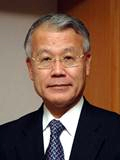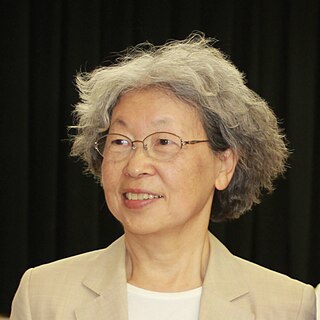
Keio University, abbreviated as Keio (慶應) or Keidai (慶大), is a private research university located in Minato, Tokyo, Japan.

Nagasaki University is a national university of Japan. Its nickname is Chōdai (長大). The main campus is located in Bunkyo-machi, Nagasaki City, Nagasaki Prefecture, Japan.

Taipei Japanese School (TJS) is a Japanese international school located in Shilin District, Taipei. TJS was established in 1947 and mainly serves the children of Japanese expatriates in Taiwan.

The Japanese School of Kuala Lumpur is a Japanese international school in Saujana Golf and Country Club in Subang, Selangor, Malaysia. The syllabus at this school is based on the Japanese Education Curriculum.

Shun'ichi Yamashita is a Japanese medical scientist serving as dean and professor at the Graduate School of Biomedical Sciences at Nagasaki University.

Hiroshi Amano is a Japanese physicist, engineer and inventor specializing in the field of semiconductor technology. For his work he was awarded the 2014 Nobel Prize in Physics together with Isamu Akasaki and Shuji Nakamura for "the invention of efficient blue light-emitting diodes which has enabled bright and energy-saving white light sources".

The Hong Kong Japanese School and Japanese International School (HKJS&JIS) is a Japanese international school in Hong Kong. It consists of a Japanese section and international section. The Hong Kong Japanese School Limited operates the school system.

The Japanese School of Guangzhou is a Japanese international school in Tianhe District, Guangzhou, Guangdong, China. It was established in April 1995. On June 13, 1995, the Ministry of Education of China approved the establishment of the school.

The Jakarta Japanese School is a Japanese international school in Pondok Aren, South Tangerang, Indonesia. It is regionally located in the Greater Jakarta area.

Satoshi Ōmura is a Japanese biochemist. He is known for the discovery and development of hundreds of pharmaceuticals originally occurring in microorganisms. In 2015, he was awarded the Nobel Prize in Physiology or Medicine jointly with William C. Campbell for their role in the discovery of avermectins and ivermectin, the world's first endectocide and a safe and highly effective microfilaricide. It is believed that the large molecular size of ivermectin prevents it from crossing the blood/aqueous humour barrier, and renders the drug an important treatment of helminthically-derived blindness.

The Japan Agency for Medical Research and Development, created in April 2015, is an independent Japanese medical research and development organization, overseen by the Office of Healthcare Policy of Cabinet Secretariat, the Ministry of Education, Culture, Sports, Science and Technology (MEXT), the Ministry of Health, Labor and Welfare (MHLW) and the Ministry of Economy, Trade and Industry (METI).
The Japanese Association of Medical Sciences is a suborganization of the Japan Medical Association (日本医師会) devoted to the development and promotion of science and research in medicine. The Japanese Association of Medical Sciences was founded independently of the Japan Medical Association in 1902 as a collaboration between 16 medical societies in Japan. Since their founding, they have held a general assembly called the Japan Medical Congress every four years except in 1947 when it was postponed for a year due to the Second World War. In 1948, they held their twelfth assembly at which point they merged with the Japan Medical Association, which has remained their parent organization since. Rather than individuals, the Japanese Association of Medical Sciences has member societies. As of 2019, they have 132 member societies.

The National Institute of Infectious Diseases is an institution of the Ministry of Health, Labour and Welfare. Its predecessor is the National Institute of Health, which was established in 1947.

Noriko Kamakura:22 was a practitioner, researcher, and academic leader in occupational therapy. She was in the initial generation of people who became occupational therapists in Japan. She greatly influenced how occupational therapy developed in that country, contributing especially in clinical approaches to persons with central nervous disorders of executive functions. In addition, she explored function of the hand in enough detail to develop a system of taxonomies that can account for the vast majority of postures and movements of the hand.
Osaka Metropolitan University, abbreviated to OMU, is a Japanese public university that was established through the integration of Osaka City University (OCU) and Osaka Prefecture University (OPU) on 1 April 2022.

The Nagasaki Velca is a Japanese professional basketball team based in Nagasaki Prefecture that competes in the second division of the B.League.
Kimito Funatsu is a Japanese chemist specializing in chemoinformatics and data-driven chemistry, a Professor Emeritus at University of Tokyo, and the research director of the Data Science Center at Nara Institute of Science and Technology.
Takashi Nagasaki is a Japanese author, manga writer and former editor of manga. He started his professional career at Shogakukan in 1980 and worked as an editor on the publisher's various manga magazines, including as editor-in-chief of Big Comic Spirits from July 1999 to 2001. Since becoming freelance, Nagasaki has worked as an author under various pen names, such as Keishi Edogawa (江戸川啓視), Garaku Toshusai (東周斎雅楽), Big O (ビッグ・オー) and Richard Woo (リチャード・ウー).
Kikuo Arakawa is a Japanese medical scientist and internist specializing in hypertension and cardiovascular medicine. He is a Professor Emeritus at Fukuoka University and the 12th President of the International Society of Hypertension.

Nyx no Lantern is a Japanese manga series written and illustrated by Kan Takahama. It was serialized in Leed's Monthly Comic Ran from March 2015 to June 2019, with its chapters collected in six tankōbon volumes















